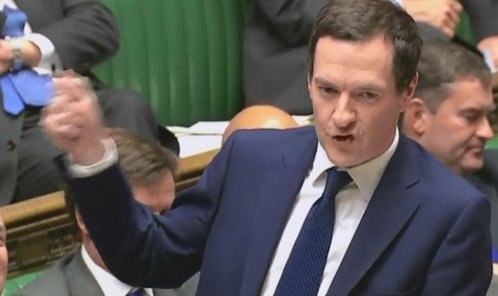As George Osborne prepares his Budget for next month he’s being urged to go easy on his planned spending cuts.
The advice is coming not just from the usual quarters but also from a highly influential international body that has previously supported his tough stance. So, should the new Conservative government have second thoughts?
The Tories made no secret of their wish to take the axe even further to public spending than they did in the last coalition government. Indeed, during the election campaign, the party made a virtue of it. We might not like cuts in our services and benefits but if they think they’re needed, then we’ll vote for them. That’s one reason why the Tories are back in power and now, of course, they don’t have to make compromises with the Liberal Democrats.
George Osborne’s aim is to complete by 2019 the task he started in 2010. By then he intends not only that the government should no longer to have a deficit on its spending but that government finances should actually be in surplus. But he wants the biggest cuts happening in the early years of this parliament.
He obviously has an electoral reason for doing so: if it works he will be able to start handing out the goodies again just before the next election. But he also claims an economic reason: cutting early, he argues, leaves vital space for the private sector to grow faster, earlier. This is what he believes happened in the last parliament and he has no time for those Keynesians who say that cutting too hard jeopardises growth.
So the plan is for £30bn worth of cuts in public spending to be made by the end the tax year 2017/18. The following year, spending would be kept constant and then allowed to grow again just before the next election. The scheduled cuts in these early years would involve £13bn from departmental budgets and £12bn from welfare spending. The rest of the savings are supposed to come from acting against tax avoidance.
Because health, education and overseas aid budgets are protected, and because the Prime Minister has been hinting that defence should be spared as far as possible, the burden of these departmental cuts will fall on the other departments and on local government spending. These, it’s been estimated, will need to be cut by 18%, meaning that at the end of the period their budgets will be a third less than they were in 2010.
This will be difficult. Everyone acknowledges that the ‘easy’ cuts have already been made and that core functions are now under threat. This week the Association of Directors of Adult Social Services, which provide preventive care services for old people, including homecare providers, have warned that further cuts would leave local authorities, which pay for such services, unable to meet all their legal obligations to vulnerable and disabled people. They claim that cuts already made mean that some homecare providers are unable to pay the minimum wage for their staff. Given the increased demand for such services as the population ages, things can only get worse if there are even more cuts, they say.
The situation facing the welfare budget is, if anything, even more difficult. The total welfare budget, at £125bn, is the biggest item of government spending. But much of it is protected. Before the election David Cameron made clear that pensioner benefits would not be touched; and since the election he has also offered his protection to child benefit. That means that the main target will be means-tested benefits paid to working age families.
These include tax credits to families on low pay (£30bn) and housing benefit (£26bn). But there are at least two problems with trying to cut these substantially. In the first place, the Conservatives’ rhetoric since the election has all been about the government being a government for working families. But also the current regime of benefits to working families has contributed to a success the government likes to trumpet: the relatively low level of unemployment and the high rates of employment in the economy. This success in the jobs market has been made possible by the incentives provided by these benefits for workers to take otherwise lowly-paid jobs. If the benefits are cut, unemployment might start to rise again.
It is in the context of all this that the government is being told to go easy. The Organisation for Economic Cooperation and Development advised the government on Wednesday to ‘even out the profile’ of its planned spending cuts. What it meant was that the government should not cut so much so soon in order to ‘lower its impact on growth’. And it added: ‘Although the composition of measures is yet to be defined, it is important that they mitigate distributional effects’, economist-speak for not hitting the poor too hard.
Other respected bodies have said much the same thing. The International Monetary Fund has encouraged countries that don’t face extreme funding problems to live with higher debt for longer. And the independent Office for Budget Responsibility described Mr Osborne’s plans for tough early cuts followed by greater relaxation as offering a ‘rollercoaster’.
The Chancellor has an answer to all this if he wants to make it. He could say that the experience of the last four years shows that big cuts in public spending do not jeopardise growth or create unemployment. He could also say that we don’t know what is round the corner: he does not want to make what he regards as the mistake of the last Labour government in spending too much when the economy was growing well and then facing a bigger problem when the global financial crisis hit. With economic growth ticking along happily at the moment, he might say, ‘the sun is shining’, so it’s now the time ‘to fix the roof’.
But it may be that Mr Osborne never quite expected to find himself in this predicament. It’s possible that the best he might realistically have hoped for before the election was a return of the Tory/LibDem coalition and he may have calculated that in that world he would have had the choice taken from him: the LibDems would have demanded that he ease up on the cuts.
Now, however, the choice is his. What should he do?










